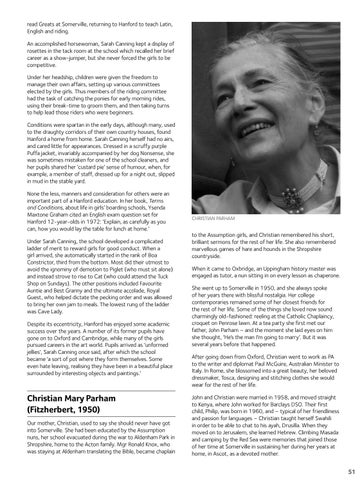read Greats at Somerville, returning to Hanford to teach Latin, English and riding. An accomplished horsewoman, Sarah Canning kept a display of rosettes in the tack room at the school which recalled her brief career as a show-jumper, but she never forced the girls to be competitive. Under her headship, children were given the freedom to manage their own affairs, setting up various committees elected by the girls. Thus members of the riding committee had the task of catching the ponies for early morning rides, using their break-time to groom them, and then taking turns to help lead those riders who were beginners. Conditions were spartan in the early days, although many, used to the draughty corridors of their own country houses, found Hanford a home from home. Sarah Canning herself had no airs, and cared little for appearances. Dressed in a scruffy purple Puffa jacket, invariably accompanied by her dog Nonsense, she was sometimes mistaken for one of the school cleaners, and her pupils shared her ‘custard pie’ sense of humour, when, for example, a member of staff, dressed up for a night out, slipped in mud in the stable yard. None the less, manners and consideration for others were an important part of a Hanford education. In her book, Terms and Conditions, about life in girls’ boarding schools, Ysenda Maxtone Graham cited an English exam question set for Hanford 12-year-olds in 1972: ‘Explain, as carefully as you can, how you would lay the table for lunch at home.’ Under Sarah Canning, the school developed a complicated ladder of merit to reward girls for good conduct. When a girl arrived, she automatically started in the rank of Boa Constrictor, third from the bottom. Most did their utmost to avoid the ignominy of demotion to Piglet (who must sit alone) and instead strove to rise to Cat (who could attend the Tuck Shop on Sundays). The other positions included Favourite Auntie and Best Granny and the ultimate accolade, Royal Guest, who helped dictate the pecking order and was allowed to bring her own jam to meals. The lowest rung of the ladder was Cave Lady. Despite its eccentricity, Hanford has enjoyed some academic success over the years. A number of its former pupils have gone on to Oxford and Cambridge, while many of the girls pursued careers in the art world. Pupils arrived as ‘unformed jellies’, Sarah Canning once said, after which the school became ‘a sort of pot where they form themselves. Some even hate leaving, realising they have been in a beautiful place surrounded by interesting objects and paintings.’
Christian Mary Parham (Fitzherbert, 1950) Our mother, Christian, used to say she should never have got into Somerville. She had been educated by the Assumption nuns, her school evacuated during the war to Aldenham Park in Shropshire, home to the Acton family. Mgr Ronald Knox, who was staying at Aldenham translating the Bible, became chaplain
CHRISTIAN PARHAM
to the Assumption girls, and Christian remembered his short, brilliant sermons for the rest of her life. She also remembered marvellous games of hare and hounds in the Shropshire countryside. When it came to Oxbridge, an Uppingham history master was engaged as tutor, a nun sitting in on every lesson as chaperone. She went up to Somerville in 1950, and she always spoke of her years there with blissful nostalgia. Her college contemporaries remained some of her closest friends for the rest of her life. Some of the things she loved now sound charmingly old-fashioned: reeling at the Catholic Chaplaincy, croquet on Penrose lawn. At a tea party she first met our father, John Parham – and the moment she laid eyes on him she thought, ‘He’s the man I’m going to marry’. But it was several years before that happened. After going down from Oxford, Christian went to work as PA to the writer and diplomat Paul McGuire, Australian Minister to Italy. In Rome, she blossomed into a great beauty, her beloved dressmaker, Tosca, designing and stitching clothes she would wear for the rest of her life. John and Christian were married in 1958, and moved straight to Kenya, where John worked for Barclays DSO. Their first child, Philip, was born in 1960, and – typical of her friendliness and passion for languages – Christian taught herself Swahili in order to be able to chat to his ayah, Drusilla. When they moved on to Jerusalem, she learned Hebrew. Climbing Masada and camping by the Red Sea were memories that joined those of her time at Somerville in sustaining her during her years at home, in Ascot, as a devoted mother.
51
